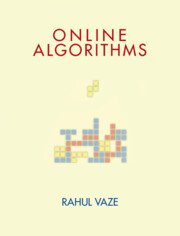Book contents
- Frontmatter
- Dedication
- Contents
- Preface
- Acknowledgements
- Notation
- 1 Introduction
- 2 Ski-Rental
- 3 List Accessing
- 4 Bin-Packing
- 5 Paging
- 6 Metrical Task System
- 7 Secretary Problem
- 8 Knapsack
- 9 Bipartite Matching
- 10 Primal–Dual Technique
- 11 Facility Location and k-Means Clustering
- 12 Load Balancing
- 13 Scheduling to Minimize Flow Time (Delay)
- 14 Scheduling with Speed Scaling
- 15 Scheduling to Minimize Energy with Job Deadlines
- 16 Travelling Salesman
- 17 Convex Optimization (Server Provisioning in Cloud Computing)
- 18 Multi-Commodity Flow Routing
- 19 Resource Constrained Scheduling (Energy Harvesting Communication)
- 20 Submodular Partitioning for Welfare Maximization
- Appendix
- Bibliography
- Index
7 - Secretary Problem
Published online by Cambridge University Press: 07 May 2024
- Frontmatter
- Dedication
- Contents
- Preface
- Acknowledgements
- Notation
- 1 Introduction
- 2 Ski-Rental
- 3 List Accessing
- 4 Bin-Packing
- 5 Paging
- 6 Metrical Task System
- 7 Secretary Problem
- 8 Knapsack
- 9 Bipartite Matching
- 10 Primal–Dual Technique
- 11 Facility Location and k-Means Clustering
- 12 Load Balancing
- 13 Scheduling to Minimize Flow Time (Delay)
- 14 Scheduling with Speed Scaling
- 15 Scheduling to Minimize Energy with Job Deadlines
- 16 Travelling Salesman
- 17 Convex Optimization (Server Provisioning in Cloud Computing)
- 18 Multi-Commodity Flow Routing
- 19 Resource Constrained Scheduling (Energy Harvesting Communication)
- 20 Submodular Partitioning for Welfare Maximization
- Appendix
- Bibliography
- Index
Summary
Introduction
In this chapter, we encounter another canonical online problem (called the secretary problem), where items (secretaries) arrive sequentially, and the objective is to select the best item (hire the best secretary); however, the selecting (hiring) decision has to be made right after the item is presented (secretary is interviewed). Moreover, once an item is selected (secretary is hired), the process stops, and no more items are presented (secretaries are interviewed), while if an item is not selected (secretary is not hired), then that item (secretary) cannot be selected later in hindsight.
Secretary problem captures the basic limitation of online algorithms: its limited view of the input and the requirement to make decisions after observing partial inputs that cannot be changed in the future. The secretary problem is trivial in the offline setting but turns out to be quite difficult in the online setting. In this chapter, we will first show that in the adversarial input setting, the competitive ratio of any online algorithm is unbounded. Thus, a randomized input setting called the secretarial input is considered, where the value or rank of items can be chosen adversarially; however, the order of arrival of items is uniformly random. Under the secretarial input, we present the optimal online algorithm that belongs to the class of algorithms that observes a constant fraction of the total number of items and builds a threshold using that; thereafter it selects the earliest arriving item whose value is more than the threshold. The optimal competitive ratio turns out to be 1/e for a large number of items. We also consider the natural generalization of the secretary problem, called the k-secretary, where multiple items are allowed to be selected.
The basic decision question encountered in the secretary or the k-secretary problem is faced in many real-life situations such as selling a house, accepting a marriage proposal, business opportunity needing massive investment, university admissions with acceptance deadlines, and many others.
Problem Formulation
Let the set of items be I with item i ∈ I having value v(i). Without loss of generality, we will assume that all items have distinct values, i.e., v(i) ≠ v( j) for i ≠ j. We are interested in selecting the item i* with the largest value in I, i.e.,
Information
- Type
- Chapter
- Information
- Online Algorithms , pp. 119 - 138Publisher: Cambridge University PressPrint publication year: 2023
